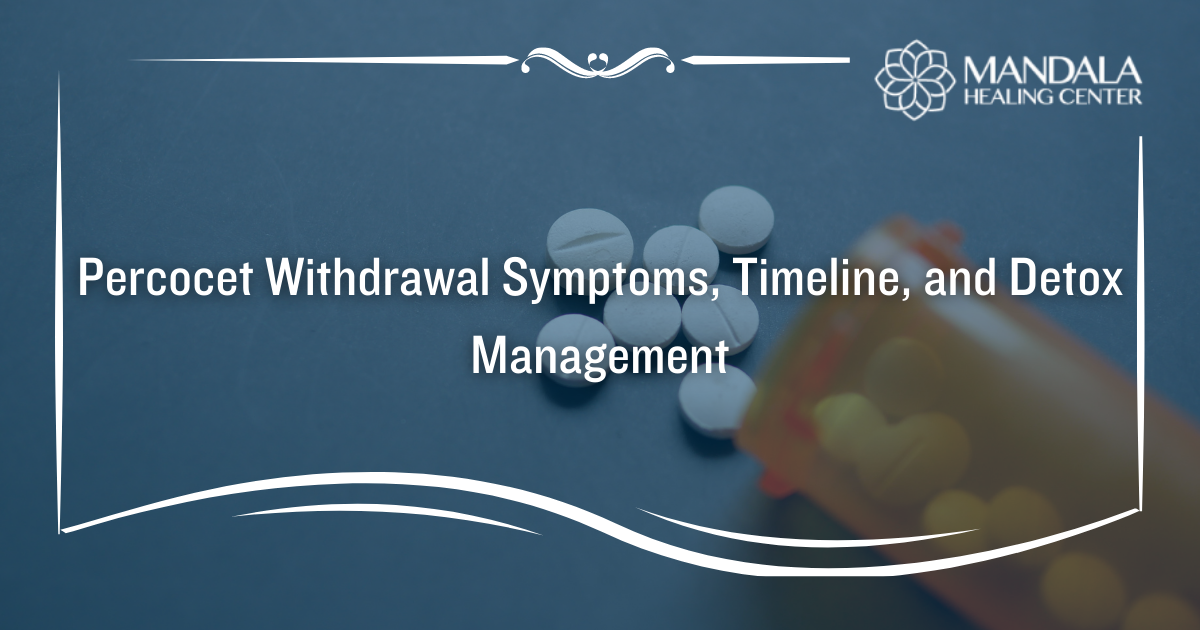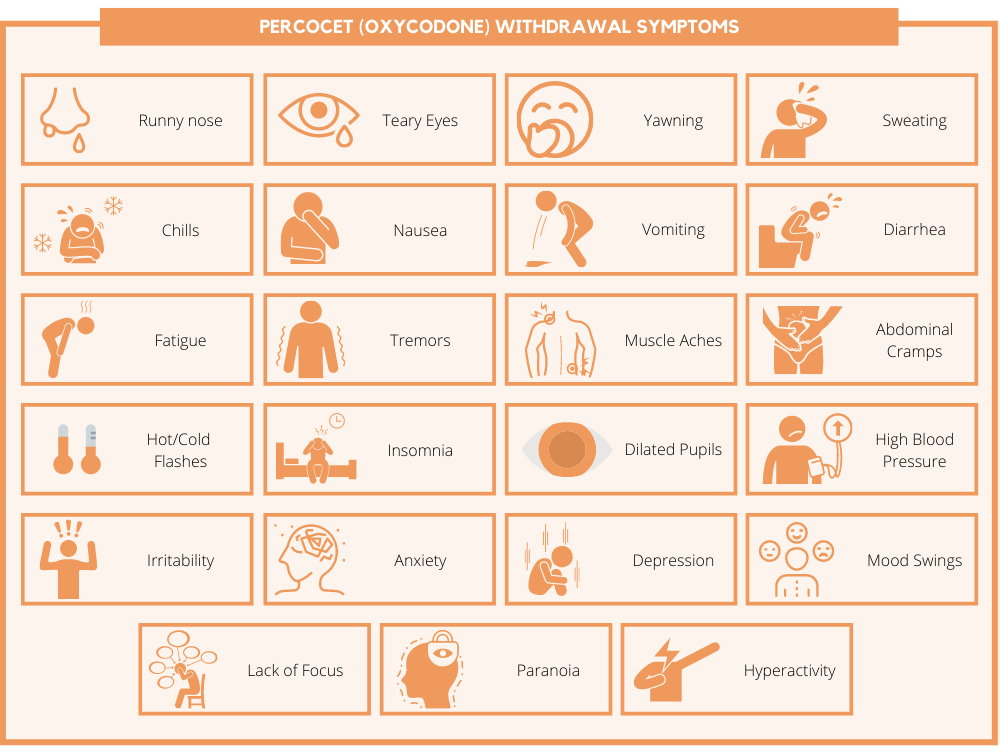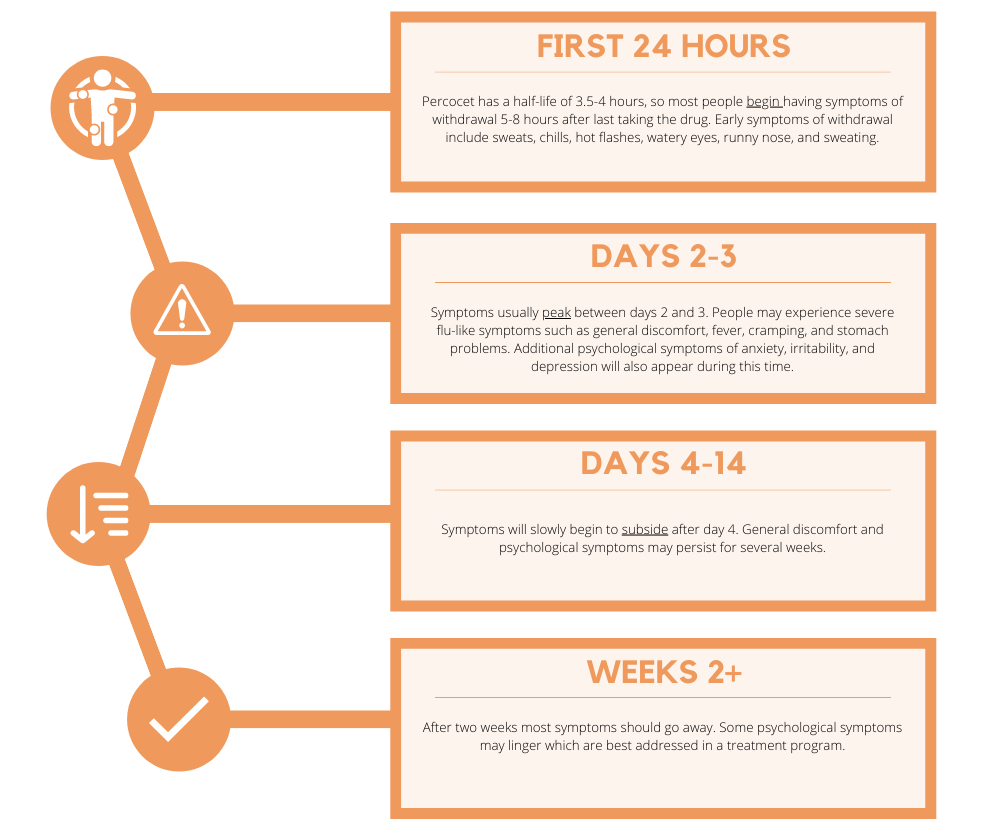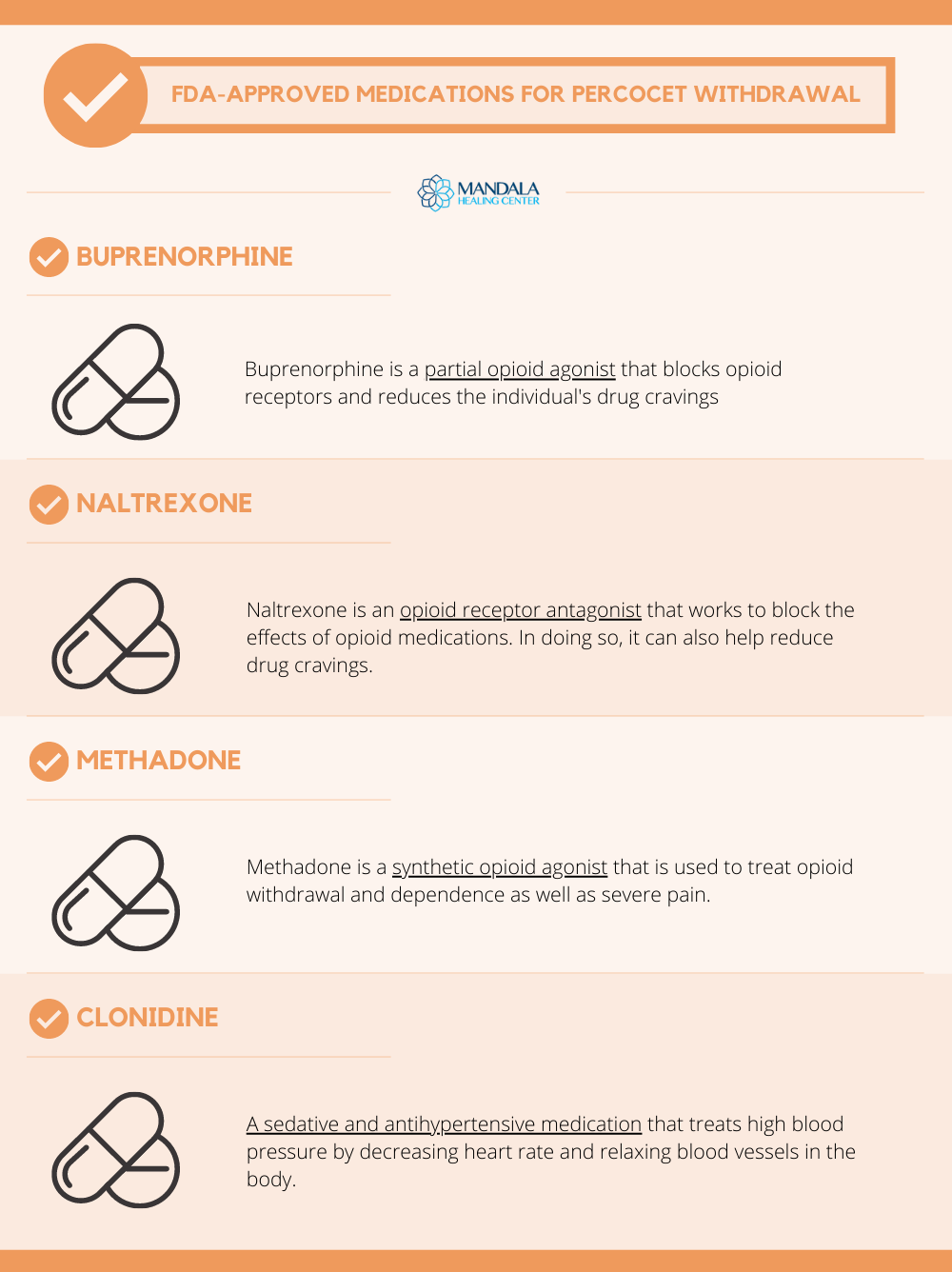Percocet (oxycodone/acetaminophen) is a prescription narcotic painkiller that is prescribed to treat moderate to severe pain. While acetaminophen is sold over the counter by itself and carries little risk for abuse, the same cannot be said for oxycodone. Oxycodone is a powerful opioid that is highly addictive and can lead to physical dependence. After becoming dependent, Percocet withdrawal symptoms make quitting the drug difficult.
Percocet detox is similar to withdrawal from any other opioid. It involves flu-like symptoms that can last for several days to two weeks. Withdrawal can be safely managed at a medical detox center with medications, supervision, and monitoring. Here is what patients can expect during the Percocet withdrawal timeline.
Percocet (Oxycodone) Withdrawal Symptoms
Doctors generally do not recommend abruptly stopping the use of oxycodone due to the prevalence of physical dependence. Between 21-29% of patients who are prescribed opioids for pain end up abusing their medication.[1] While medication abuse increases the risk of dependence, physical dependence can also develop when opioids are taken as directed over an extended period of time.
Abruptly stopping the use of opioids like oxycodone can result in flu-like withdrawal symptoms. Physical and psychological symptoms of Percocet (oxycodone) withdrawal include:[2]
- Runny nose
- Watery eyes
- Yawning
- Sweating
- Chills
- Nausea
- Vomiting
- Diarrhea
- Fatigue
- Tremors
- Muscle aches
- Abdominal cramping
- Hot or cold spells
- Insomnia
- Dilated pupils
- High blood pressure
- Irritability
- Anxiety
- Depression
- Mood swings
- Lack of focus
- Paranoia
- Hyperactivity
Percocet Withdrawal Timeline
Symptoms of Percocet withdrawal can start in as little as four hours after last taking the drug. Most people have symptoms that last for about one week, but some chronic users may experience symptoms of withdrawal for 3-4 weeks.
How severe a person’s symptoms become, how soon they begin after the last dose, and how long they last depend on various factors, such as:
- The method of administration of the drug
- How long a person abused the drug
- The dose of the drug consumed regularly
- Polydrug use (using more than one substance at a time)
- Individual health factors like height, weight, age, gender, and health conditions
While the Percocet withdrawal timeline varies from one person to the next, here is a general idea of what patients can expect:
- First 24 hours: Percocet has a half-life of 3.5-4 hours, so most people begin having symptoms of withdrawal 5-8 hours after last taking the drug. Early symptoms of withdrawal include sweats, chills, hot flashes, watery eyes, runny nose, and sweating.
- Days 2-3: Symptoms usually peak between days 2 and 3. People may experience severe flu-like symptoms such as general discomfort, fever, cramping, and stomach problems. Additional psychological symptoms of anxiety, irritability, and depression will also appear during this time.
- Days 4-14: Symptoms will slowly begin to subside after day 4. General discomfort and psychological symptoms may persist for several weeks.
- Weeks 2+: After two weeks most symptoms should go away. Some psychological symptoms may linger which are best addressed in a treatment program.
Medical Detox for Percocet Withdrawal
Although the symptoms of opioid withdrawal are not life-threatening, dehydration due to loss of fluids and relapse due to psychological cravings are not uncommon. As a result, it is best to detox carefully in a medically supervised setting.
Medical detox centers in West Palm Beach provide nutritional support to keep the body balanced and healthy, medications to relieve symptoms of withdrawal, and therapeutic interventions to help treat Percocet addiction. Throughout the detox process, doctors and nurses are there for monitoring and supervision. They are also prepared to intervene in the case of a medical emergency.
Certain FDA-approved medications are usually prescribed to help manage symptoms during the Percocet withdrawal timeline. These include:[3]
- Buprenorphine (Suboxone, Subutex)
- Methadone
- Clonidine
- Naltrexone (Vivitrol, Revia)
Before leaving detox, patients meet with a substance abuse counselor to discuss an aftercare plan that involves further treatment.
Treatment for Percocet (Oxycodone) Addiction
Opioid addiction is a complex condition that requires long-term treatment. People who go through detox without treatment or those who rely on medications alone will likely be unsuccessful at staying sober in the long term. While treatment starts with detox, there is much more that goes into treating Percocet addiction.
After detox, patients go to inpatient rehab where they stay in a structured and sober living environment and attend therapy sessions during the day. In therapy, patients are encouraged to explore the reasons why they use substances and what circumstances trigger drug cravings. Patients are also introduced to 12-Step fellowships and other recovery-related resources in the community.
After completing inpatient rehab, patients are encouraged to continue their recovery with aftercare. Aftercare may consist of outpatient rehab, individual counseling, medication management, sober living, and/or peer support groups. The most important thing is that both treatment and aftercare are personalized to meet each patient’s unique needs.
Find Help for Percocet (Oxycodone) Addiction and Abuse Today
Getting through the Percocet withdrawal timeline can be difficult, especially without medical assistance, but staying sober in the long run can be even harder. Here at Mandala Healing Center, we provide all patients with a comprehensive treatment approach to set them up with lasting success. Between holistic treatments and individualized care, patients learn the life skills they need to stay in recovery.
If you or a loved one are addicted to Percocet or other opioids, our team is here to help. Contact us today to get started.
References:















